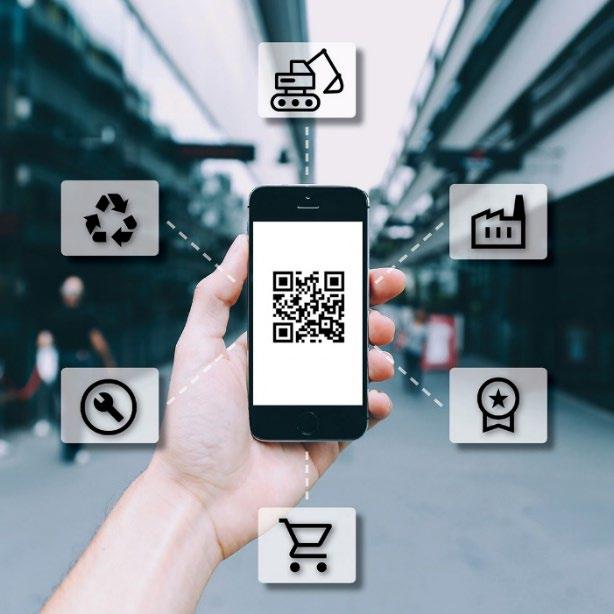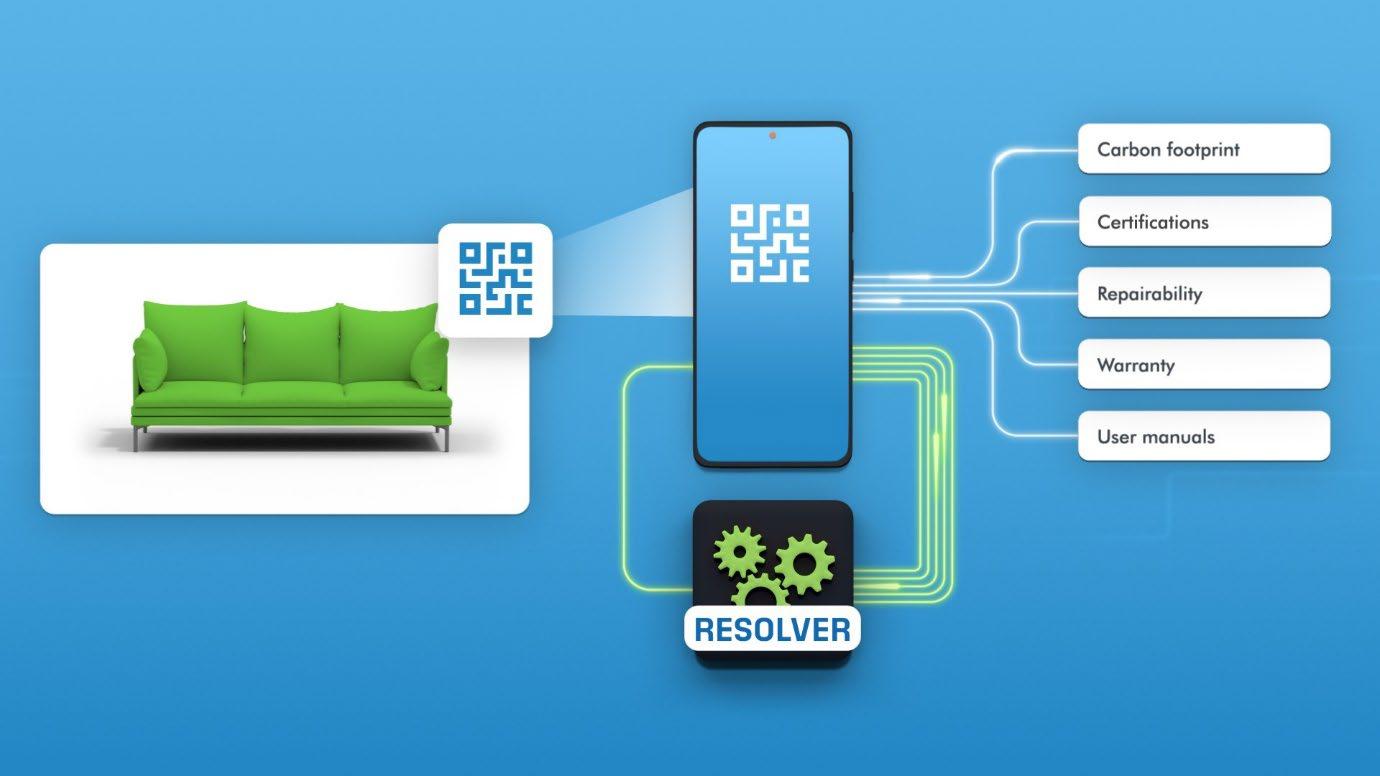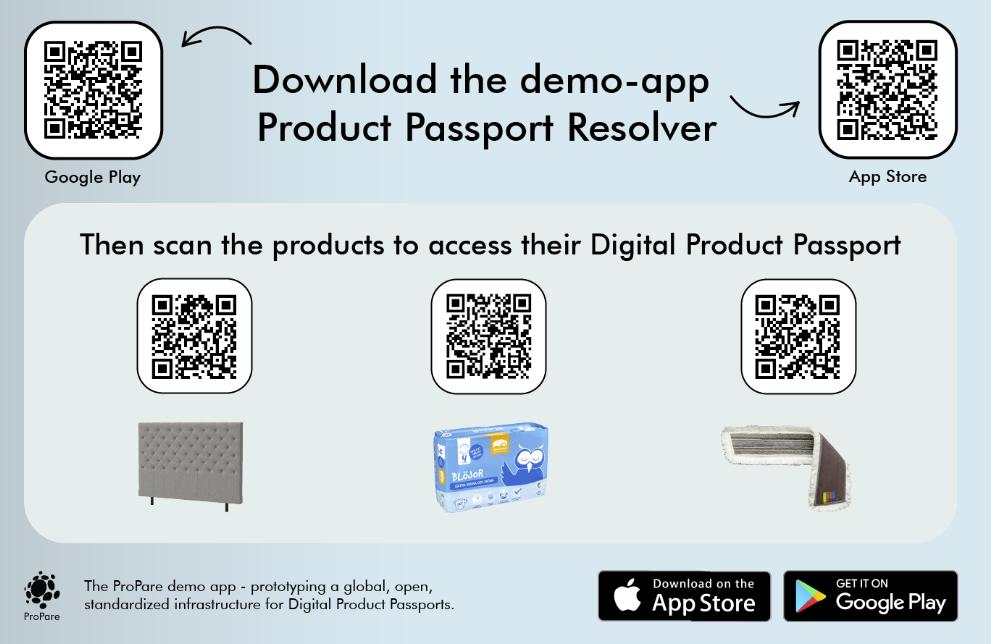ProPare Product Passport Resolver





A pilot project prototyping an open global infrastructure for Digital Product Passports to stimulate increased circularity, traceability, and transparency.




ProPare Product Passport Resolver 2 ©Axfoundation info@axfoundation.se www.axfoundation.se This report is produced by Axfoundation Copyright: Use and distribution of material in this document are encouraged. The material may be copied, downloaded, and printed, provided that Axfoundation is indicated as the source and copyright holder and that the above-named author is indicated when referencing. Contents Summary 3 The EU Legislation and Digital Product Passports 4 6 Compelling Benefits with Digital Product Passports 5 The ProPare Project 6 The Prototype 7 Project Deliverables 8 7 Good Reasons to Test ProPare 9 Global Standards Used in ProPare 10 Placement of the QR code 10 Reflecting on the Project: What Did the Project Partners Gain? 11 The Next Step 15 Other DPP initiatives in Sweden and the EU 16 Certified to LAST 16 CIRPASS 16 KEEP 16 Trace4Value 16 Trust4Value 16 Product Passport as an enabler for circular flows of furniture 16 Conclusion and Recommendations 17 Recommendations to Brand Owners and Other Companies 17 Recommendations to Third-Party Certification Organizations 17 Recommendations to Policy Makers 18 Recommendations to Technical Service Providers 18
Summary
The upcoming EU legislation will require all products on the EU market, except food and medicine, to have Digital Product Passports (DPP). These will provide data on product content and sustainability performance throughout the product’s life cycle, enabling consumers and businesses to make sustainable choices.
The ProPare project developed a prototype showing how a global, standardized infrastructure for Digital Product Passports (DPP) could work in practice, using a set of global, open, and competition-neutral standards.
The ProPare Project in Short
Project Period: January 2022-April 2023
Project Management: Axfoundation
Technical Management: GS1 Sweden
Stakeholder Management: The Swedish Trade Federation
Technical Development: Nordic Swan Ecolabel
Demo-app Developer: Blue Cromos
Brand Owners: Ahlsell, Dagab/Axfood, Mio
ProPare is self-financed by the project partners and brand owners. Learn more at www.propare.eu
The project has proven that the solution works to ensure trustworthy product data for all users, sourced in real time from the third-party certifier and the brand owner. With a common language used to identify every single unique product on the market, and a resolver pointing to the right data sources, product data is displayed in a demo-app in realtime, deriving information from multiple, decentralized sources.
The ProPare prototype complies with the technical principles for Digital Product Passports as set out in the EU draft EcodesignforSustainableProductsRegulation (ESPR). Going forward, the ProPare prototype solution can be used to link all types of data to a product, no matter the user, industry, or product category.
One main purpose of the project is learning and knowledge -sharing. This report explains why global standards are needed when implementing the DPP, using the ProPare prototype as an example. The technical requirements and steps used in the Propare prototype are compiled in the ProPare Technical Solution Guide for Digital Product Passports, open for any stakeholder to explore and use.
Recommendations
• Policy Makers: For DPP to be successfully implemented, a global standardized infrastructure must be used. The ProPare prototype shows how it can be done.
• Brand Owners: Gain a competitive advantage as a brand owner. Start preparing now for the Digital Product Passports and future -proof your business. Learn from this standard.
• Third-party Certification Bodies: Help brand owners promote their certified products for consumers and professional buyers to accelerate the transition towards sustainable consumption.
• Technical Service Providers: Use this prototype for global infrastructure to develop solutions for brand owners and other actors.
ProPare Product Passport Resolver 3
The EU Legislation and Digital Product Passports
The European Green Deal aims to transform the EU into a modern, resource -efficient and competitive economy, ensuring no net emissions of greenhouse gases by 2050 and economic growth decoupled from resource use. Herein, the transition to a circular economy is paramount, as it holds the key to unlocking significant and tangible impact in shaping a sustainable future.
The roadmap towards a circular economy entails a set of frameworks and proposals, such as the CircularEconomyActionPlan (2020) and the proposal for EcodesignforSustainableProducts Regulation (ESPR) (2022).
What is a Digital Product Passport (DPP)?
DPP is a set of product-specific digital data about each product, and readable for the end-consumer or procurer. The purpose is to make relevant information visible during the product lifecycle, to increase traceability and transparency which, in turn, will spur sustainable production and consumption. Ultimately, DPP will facilitate a circular economy through the sharing of different sustainability data by manufacturers about their products. For example, the information may relate to durability, reliability, reusability, upgradability, reparability, recyclability, presence of substances of concern etc.
ESPR represents the foundation of the European Commission's strategy for environmentally sustainable and circular products, which seeks to improve the environmental impact of products throughout their life cycle. This involves an emphasis on production data and is the reason behind the EU Commission's proposal for the Sustainable Product Regulation on 30 March 2022.
The draft regulation includes the EU Digital Product Passport concept and applies to all physical goods, as well as components and intermediate products, made available on the EU market. The legislation is projected to come into effect as early as 2025.
In addition to improving information flows in the linear economy, the DPP will facilitate the dissemination of product -specific data to all relevant stakeholders through decentralized and competition-neutral global standards. This will enable full traceability throughout the value chain, from raw material extraction and manufacturing to end consumers and even second-hand consumers. It will also enable the development of new circular business models while providing public authorities and policymakers with reliable information. Lastly, the DPP will allow citizens to access relevant information on products they intend to buy or rent.
• product durability, reusability, upgradability and reparability
• presence of substances that inhibit circularity
• energy and resource efficiency
• recycled content
• remanufacturing and recycling
• carbon and environmental footprints
ProPare Product Passport Resolver 4
The DPP framework will enable a wide range of information to be provided
Here are some potential examples:
6 Compelling B enefits with Digital Product Passports
1. Sustainable Production and Circular Transition
DPPs enable the transition to a circular economy by promoting material and energy efficiency, extending product lifetimes, and optimizing product use.
2. Sustainable Business Models
Businesses can implement services and repair-based business models due to the improved access to data provided by the DPPs.
3. Consumer Guidance
DPPs help consumers make sustainable and informed choices.
4. Efficient Administration
DPPs facilitate authorities in ensuring compliance with current legislation. They provide relevant authorities with a helicopter perspective, enabling authorities to identify hotspots where noncompliance risks are high.
5. Healthy Competition on Equal Terms
DPPs will be mandatory for almost all products (except food and medicine) put on the EU market.
6. Simplifies Product Recalls and Reduces the Risk of Counterfeits
Each product receives a unique identity with DPPs, making it traceable to whoever puts the product on the market. This makes counterfeiting more difficult and makes it possible to identify exactly which products in the market need to be recalled and if they have been returned.
ProPare Product Passport Resolver 5
The ProPare Project
In early 2022, four nonprofit organizations joined forces and established the Steering Group of the ProPare project in Sweden. The goal was to demonstrate the real-time functionality of traceable thirdparty certifications on products using global and open standards and gain knowledge on how to implement Digital Product Passports (DPP) in practice.
The organizations were GS1 Sweden, the Swedish Trade Federation, Ecolabelling Sweden, and Axfoundation. They brought their respective areas of interest and competencies to the table, including global standards, business competitiveness, and third-party certifications, to speed up the transition toward sustainable production and consumption.
The quartet’s common interest was to pave the way for the upcoming EU legislation and even influence the EU Commission’s proposal to favour open, non-competitive, global standards for DPP. Implementing the opposite, with centralized databases and silo solutions, will come with risks and challenges, such as outdated information, non-compatible systems, and an enormous administrative burden for companies. On the other hand, a decentralized, open, global solution would mitigate these risks and streamline data flows.
The ProPare project aimed to demonstrate that DPP should be based on such open global standards, and it did so through a pilot project. ProPare stands for Product Passport Resolver, and the name leads the thoughts to 'prepare', which is very much what the pilot project is about; contributing to preparedness for the upcoming legislation and adaptation to its impact on trade and businesses.
The project arose from the need to investigate if, and how, competition-neutral global standards could serve as an underlying infrastructure for Digital Product Passports. The project focused on whether it would be possible to build a common language for product identification and enable real-time visualization of the data from multiple sources.
The ProPare project was initiated in February 2022 and completed one year later. It included three workflows: Analysis, Development, and Implementation. In March 2023, the prototype was ready and presented at a webinar with over 700 participants.

ProPare Product Passport Resolver 6
The Prototype
The scope of the project was narrow, focusing on three products that were individually linked in real-time with one criterion, the Nordic Swan Ecolabel. This specific criterion was chosen as third-party certifications will play an important role in the future.
It’s a prototype – not a ready-made solution
The ProPare solution is not a fully functional Digital Product Passport but a prototype that demonstrates how it works in practice.
To visualize the concept, a demo-app was developed. Three Swedish brand owners, Ahlsell, Axfood/Dagab, and Mio, contributed with a small set of products, all of which were certified with the Nordic Swan Ecolabel. QR codes were generated for the products, and the QR code carries the product identity as a link to the resolver, which directs the request to the correct web servers.

The proof of concept showed that it is possible to build a common language for product identification and enable real-time visualization of the data retrieved from multiple sources using a resolver
Learn more about how the ProPare prototype works in the ProPare explainer: https://youtu.be/VIDnqWCQvOk
ProPare Product Passport Resolver 7
Project Deliverables
The ProPare solution builds on a resolver, an IT system that allows verified product data to be transferred in real-time from a variety of different sources to a large number of recipients, without being compromised along the way.
To verify that the infrastructure works, a demo-app was developed and can be downloaded from the Google Play Store and the App Store. The QR codes on the chosen products in the project – such as Ahlsell's floor cloth, Dagab's Minstingen diapers, and Mio's headboard - can be scanned with the app and in real-time show that they are certified with the Nordic Swan Ecolabel
The ProPare Technical Solution Guide for Digital Product Passports contains the technical requirements and steps necessary for further exploring and utilizing the ProPare solution. The guide is open and free to use – see it as a basic recipe for further developments to be added.

ProPare Product Passport Resolver 8
ProPare’s demo-app, the Product Passport Resolver, is accessible in AppStore and Google Play.
7 Good Reasons to Test ProPare
1. Open, Global, Competition-Neutral Infrastructure
The ProPare prototype addresses relevant risks regarding infrastructure and data storage and accommodates all technical requirements to create interoperability between systems. By using decentralized data sharing, there will be good opportunities for both small and large companies to create useful DPPs.
2. Fulfils the EU’s Basic Conditions
The ProPare prototype is a long-term and stable choice to use as an underlying infrastructure for DPPs. ProPare accommodates all the basic conditions in the EU’s Ecodesign for Sustainable Products Regulation (ESPR).
3. Generic Solution
ProPare’s prototype is a generic solution that enables companies regardless of industry, company, or product to respond to the requirements for a product passport vis-à-vis authorities and consumers. The solution can be used by any actor in the chain –company, government, procurer, or consumer.
4. Real-Time Data
Product data is displayed in real-time in a demo-app, deriving information from multiple, decentralized sources.
5. Control Over Data
The solution allows brand owners to retain control over what data is presented in the DPP, even if the information is stored locally by the information owner.
6. Reliable Data from Third-party Certification bodies
Brand owners and other actors can provide verified information on third-party certifications, as this type of data is stored and provided by the certification body, not by the supplier or brand owner.
7. Easier Handling of Sustainability Data
By using existing technology in a new way, the prototype avoids cost-driving large databases where copies of data are stored.
ProPare Product Passport Resolver 9
Global Standards Used in ProPare
The ProPare prototype is built on a set of global standards. These are the ones being used:
• Global Trade Item Number (GTIN): A unique number provided by GS1 to give products and packaging a globally unique identity. These numbers are used worldwide. Basically, all commercial products have a GTIN which ensures that trade items are not mixed up with each other.
Technical Guideline
More information about the standards is available in the ProPare Technical Solution Guide. The guide is free to use and available at GS1 Sweden’s website.
• GS1 Digital Link uri syntax standard: A standard that enables the consistent representation of GS1 identification keys within web addresses as well as within barcodes containing web addresses to link to online information and services.
• GS1 Digital Link – link types and resolver standard: A GS1 conformant resolver is a web server that can process GS1 Digital Link URIs, redirecting or directly answering requests by this standard.
• GS1 Web Vocabulary: Collects terms defined in various GS1 standards and data systems and is made available for general use following Linked Data principles. The GS1 Web Vocabulary includes the link types used in GS1 Digital Link to annotate links to related resources, such as product information pages, instruction manuals, related videos, certification information, brand owner APIs, traceability information, and more.
• JSON-LD: Linked Data is a way to create a network of standards -based machine interpretable data across different documents and websites. It allows an application to start at one piece of Linked Data and follow embedded links to other pieces of Linked Data that are hosted on different sites across the Web.
Placement of the QR code
In the upcoming DPP, the product identity (for example, encoded in a QR code) should be present on the product, or be included in the documentation that accompanies the product. According to the EcodesignforSustainableProductsRegulation (ESPR), the idea is that data carriers with identifiers should be placed directly onto the product, using a technology that will make it stay in place, and be legible, throughout the life of the product.
Normally, the same code will likely also be present on the packaging. This will facilitate the purchase decision, making it possible for the customer to scan the code without having to open the packaging.
ProPare Product Passport Resolver 10
Reflecting on the Project: What Did the Project Partners Gain?
At the end of the ProPare project, the brand owners involved in the initiative were asked to reflect on the lessons learned and the benefits of testing solutions for DPP at an early stage. Their responses answers can offer valuable guidance for other companies preparing for DPP. In summary, through this project, creating a consensus around a future standard has shown both how important it is and simultaneously challenging.
Why did your organization join ProPare?
“We joined ProPare because we needed to improve the data quality of our private label brands and acquire more data. We also wanted to get an understanding of the resources required to handle such data in the future. Lastly, we joined because we aim to take a clear position in driving product data quality. As producers, we believe it’s our role to guide decision-makers in the right direction.” (Ahlsell)
“The decision to join ProPare was made by our Sustainability manager. We were already involved in a preliminary study on 2D codes and GS1 Digital Link, so we were familiar with similar projects. Our aim was to be one step ahead and stay informed about emerging technologies ” (Dagab)
“The legal requirements outlined in the ESPR are highly relevant, and ProPare offered an opportunity to merge digitization and sustainability. The commitment to join came entirely from within our organization.” (Mio)
ProPare Product Passport Resolver 11
“We aim to take a clear position in driving product data quality. As producers, we believe it’s our role to guide decision-makers in the right direction.”
Tomas Jansson, Ahlsell
What have been the benefits of the project?
“The project has generated enormous interest within the organization, particularly among the marketing department, which sees the potential in becoming even more credible in marketing our own branded products on websites. It has been valuable to discuss the issues and increase our understanding of how complex data exchange will be in the future. Thanks to the project, we now have a better insight into the ongoing EU-level process and the upcoming legislation. Overall, the project has added more value than we originally expected.” (Ahlsell)
“It has been good to start with a small scope, specifically, the Nordic Swan Ecolabel, which was enough to illustrate how it could work. Along the way, we discovered some internal errors in our data collection, which we corrected to make it work with the ProPare resolver and the demo-app. The fact that the certifications are verified by the real source in real time adds credibility. Today, we have to have faith our suppliers provide us with the correct information, which is not always the case. This system allows us to double-check and verify the data.” (Dagab)
“One benefit of the project has been the internal understanding of the issues we need to consider in line with the upcoming legislation. Is the website the right place to provide this information? What will be the technical requirements? What system support do we need? We want to communicate with our customers in a credible and assured way. The project also made us realize some errors in the chain of custody. Hopefully, this system will minimize mistakes and make information sharing easier and safer. It’s been perfect to work with the Nordic Swan Ecolabel since we already work with them. It’s good to start with a small scope.” (Mio)
ProPare Product Passport Resolver 12
“Thanks to the project, we now have better insight into the ongoing process on the EU level and the upcoming legislation. Overall, the project has added more value than we originally expected.”
Tomas Jonsson, Ahlsell
“Initially, it took quite a lot of project management but once we identified all the answers, things went smooth.”
Jonas Elander, Dagab
What has been challenging?
“The IT department quickly resolved the technical aspects However, upscaling to include all products poses a challenge as there is still a lot of data that is missing on several products. It is worrying that we do not yet know which data will be required and how it will be calculated, for example, CO2e in EPDs (Environment Product Declarations). We were not aware that it was still unclear from the EU's side which parameters will be included in the new regulations Today there is a discrepancy between expectations and reality, and a lot of work remains for the legislators ” (Ahlsell)
“Dagab is a large organization with several companies, and it has been challenging to identify who should be involved. The choice of product required consideration: whether it was suitable to test in the ProPare prototype, whether it was certified with the Nordic Swan Ecolabel, and whether any external website suppliers could help with the development Initially, the project required quite a lot of project management, but once all answers were identified, things went smoothly ” (Dagab)
“Technically, we encountered problems with some data where the product attributes were missing, but they were resolved a few days before the launch. On an organizational level, it has been difficult to appreciate the among of internal resources needed in the development process, and how to communicate about the project internally. It has been a challenge to align the digitization with sustainability.” (Mio)
“Moving forward together in a unified way, which was the purpose of testing the embryo to standard, presented a challenge as well as the coordination around what we agreed on. There were many contacts in the project, yet this is not where coordination has been lacking. It is rather an inherent and inbuilt dynamic. Technically, the columns and rows in the solution must mean the same thing to everyone, and when the APIs communicate with each other. The developers were nervous due to the lack of specifications and we needed to invent the project over time. We had ideas, but we needed to discuss them while paving the way.” (Blue Cromos)
ProPare Product Passport Resolver 13
“On an organizational level, it has been difficult to appreciate how much internal resources were needed in the development process, and how to communicate about the project internally. It has been a challenge to integrate digitization with sustainability.”
Ida Andersson, Mio
What is the next step for your organization?
“An extension could emphasize that Ahlsell is not always the brand owner. The big win comes when we can easily retrieve information according to a uniform standard. We heavily rely on suppliers, who provide data without adherence to standards and data quality assurance. It would be interesting to dig deeper into the supply chains as there are various standards and industry databases. We need to identify a common validated standard from which data can be retrieved straightforwardly and in a specific format. It is crucial to integrate this into our communication to ensure that global standards do not create complications for retailers or consumers. ” (Ahlsell)
“The resolver solution can be applied to food as well, and be applicable for other certifications, such as KRAV. We intend to use this solution to share more information on our own brands’ websites, including for example Minstingen and Eldorado’s non-food products.” (Dagab)
“It would be interesting to explore additional certifications and identify the benefits for our customers. While certifications may not be mandatory, they are likely to serve a significant role in aggregating and verifying various parameters. If we were to take a step upstream, how would it work for actors in the supply chain, and who would be responsible for providing specific information? This is an aspect worth investigating. Moving forward, we may enhance our communication with suppliers based on the extent of the requirements We aim to find effective ways to share and structure information. Ultimately, we strive to transform legal requirements into customer benefits ” (Mio)
Do you believe in DPP as a driving force toward a circular economy?
“Yes, DPP will be an important component in operationalizing the circular economy. We will have the ability to track a product, similar to a service manual for a car. It’s truly remarkable to be involved in this advancement By establishing standards and adopting a unified approach, it can be achievable The drafted legislation regarding green claims will make companies hesitant to make claims and fear being accused of greenwashing. With the assistance of DPP, what you assert will be verifiably true ”
(Blue Cromos)
ProPare Product Passport Resolver 14
“The resolver solution can be applied to food as well, and be applicable for other certifications, such as KRAV. We intend to use this solution to share more information on our own brands’ websites.”
Jonas Elander, Dagab
The Next Step
In Sweden as well as in Europe at large, there is a great interest in DPP in general and ProPare in particular. More than 2,000 people watched ProPare’s webinars in late November 2022 and in March 2023. Spurred by the interest, ProPare developed www.propare.eu to share knowledge, answer frequently asked questions and provide recommendations to policymakers, businesses and technical service providers
The ProPare prototype solution shows how an infrastructure for DPP can work in practice, using thirdparty certifications as an example In the next step, any type of information can be linked to a product showcasing everything from basic data on product properties to complex sustainability data, such as recyclability, climate impact from production and component contents
Moving forward, all actors need to start preparing for the implementation of DPP Brand owners can gain a competitive advantage by getting a head start Public procurement strategies need to align with the upcoming legislation. Producers need to prepare for automated data provision. Market departments need to analyze how DPP will affect business models and customer service. Technical providers, SMEs, decision-makers – all stakeholders need to stay updated with the legislation process and the ongoing development around DPP.
An important part of the ongoing work leading up to the issuing of product-specific legislation will be to select existing terminologies/taxonomies or define and standardize terminologies/taxonomies for the characteristics that need to be reported in the Product Passports. The first Swedish standards on terminology, guidelines, etc., will be published for public consultation in 2023, and are planned for publishing in late 2023 or early 2024, but of course, all of this is dependent on the volume of comments and the outcome of the votes.
ProPare Product Passport Resolver 15
Other DPP initiatives in Sweden and the EU
The ProPare project is far from the only initiative aiming to understand, prepare and support stakeholders in the transition to Digital Product Passports. Other initiatives include:
Certified to LAST
RISE facilitates and quality assures communications between companies and consumers by developing a certification and labelling concept called LAST, where the four letters stand for Longlifedesign,Accessiblespareparts,Sustainablematerialsand Transparency. Learn more at ri.se…
CIRPASS
Deep Dive
Several DPP initiatives presented their focus and findings so far at the ProPare webinar in November 2022. Watch the webinar here!
Funded by the European Commission under the Digital Europe Programme, CIRPASS is a collaborative initiative to prepare the ground for the gradual piloting and deployment of a standards -based Digital Product Passport aligned with the requirements of the Proposal for Ecodesign for Sustainable Product Regulations (ESPR), with an initial focus on the electronics, batteries, and textile sectors. Learn more at Cirpassproject.eu
KEEP
This innovation project led by Chalmers Industriteknik aims to create a traceability solution for electronic products. Together, the 22 project partners are working towards a future with sustainable production, increased reuse, and recycling. KEEP is part of Trace4Value. Learn more at Keepelectronics.com
Trace4Value
Trace4Value gathers several Swedish traceability projects to contribute to the transition toward a circular economy. Trace4Value is financed by Vinnova, Sweden’s innovation agency, and collects more than 50 organizations from five industries. Learn more at Trace4value.se
Trust4Value
Trust4Value is a one -year Vinnova-financed project which builds capacity in the area of traceability by increasing organizations’ knowledge and understanding of the entire traceability chain and thereby actively influencing future policy. Learn more at Vinnova.se
Product Passport as an enabler for circular flows of furniture
The project´s objective is to prepare the Swedish furniture industry for the Product Passports proposed and develop the concept into a driving force for increased innovation, circularity and competitiveness throughout the furniture’s value chain. The project is coordinated by Chalmers Industriteknik and financed by Vinnova. Learn more at Vinnova.se
ProPare Product Passport Resolver 16
Conclusion and Recommendations
To accelerate the transition to sustainable development and avoid fragmented solutions, Digital Product Passports must be based on open, global, and competition-neutral standards. The opposite, with noncompatible solutions, would risk suboptimization, and transparency and accessibility could be lost.
Swedish companies show great interest in DPP, and rightfully so. DPP will entail technical, administrative, and communicative adaptations. Therefore, proactiveness at the management level of companies is crucial
The ProPare pilot project has proven that open standards work in practice: Selected products from three different brand owners have been linked to The Nordic Ecolabelling database and their product passport data is shown in realtime in the ProPare demo-app This proof of concept paves the way for open competition-neutral standards to be the established infrastructure for DPP.
DPPs have the potential to spark s ustainable production and consumption and stimulate increased circularity. Using open global standards will accelerate the development of DPP. It will benefit the planet, businesses, and consumers.
The Product Passport Resolver demo-app is available on Google Play and AppStore. It’s a prototype showing how DPP could work in practice. Only the QR-codes distributed by the ProPare projects can be used in the app.
Recommendations to Brand Owners and Other Companies
1. Gain a Competitive Edge with Digital Product Passports: Discover how DPPs can benefit your customers, businesses, products and services, giving you a competitive advantage
2. Ensure Availability of the Right Data: While EU legislation will determine the minimum level of data to be shared, take the initiative to identify what type of data is “must, need, nice” to communicate through the Digital Product Passport, maximizing its businesses and sustainable transition benefits.
3. Conduct Small-Scale Testing: Implement a pilot project to test the sharing of product data with customers, businesses, and governments. Select a solution that enables efficient communication of relevant information to all target groups.
4. Influence the Standards: Contact a standardization organization to actively shape the design of standards, infrastructure, and solutions for the Digital Product Passport
Recommendations to Third-Party Certification Organizations
1. Support Brand Owners and Retailers: Help businesses in promoting certified products through DPP to drive sustainable consumption.
2. Ensure Availability of Relevant Data: Establish partnerships with retailers and procurement organizations to assist them in showcasing and promoting products certified by you, to consumers and professional buyers
ProPare Product Passport Resolver 17
It’s a demo-app, not a ready-made solution
Recommendations to Policy Makers
1. Ensure Global, Standardized S olutions: Ensure that the implementation of DPPs is built upon a global, open, and standardized infrastructure, and enables a powerful implementation to create favourable conditions for a circular economy. A robust implementation of a global infrastructure is essential to avoid locking into incompatible solutions.
2. Get Involved Early On: Expand your knowledge base on DPPs, including their technical and practical aspects, implementation strategies and the potential impact of their introduction
3. Pragmatic Legislation: Ensure legislation is designed in a way that allows for manageable implementation, considering the selection of product groups and attributes to include in the DPPs
4. Protect Competitiveness: Safeguard corporate confidentiality during the implementation of DPPs, ensuring that companies can preserve their distinctiveness and competitiveness.
5. Raise Awareness: Support companies in their journey towards valuable product passports by communicating the benefits to the public.
Recommendations to Technical Service Providers
1. Start Developing Products: Draw inspiration from ProPare’s infrastructure and create a prototype for Digital Product Passports. Utilize ProPare’s experiences as you embark on your learning journey to develop a DPP solution that meets your customers’ requirements. Download ProPare ’s Technical Guidelines on GS1 Sweden’s webpage.
2. Make Use of Global Standards: Regardless of your customer offering, ensure that your company’s solution is built on an open, global, standardized infrastructure to ensure interoperability between systems. Developing solutions that are incompatible with other systems can lead to high costs and undermine the purpose of DPPs.
3. Offer Your Solutions: Seize the opportunity to support brand owners in their DPP journey by providing guidance, communicating the benefits, and delivering compatible solutions based on decentralized data storage.
4. Build Flexible Solutions: Be prepared to easily adapt your solutions to accommodate different businesses and industries based on their specific needs.
ProPare Product Passport Resolver 18
The ProPare prototype shows how a global, standardized infrastructure for Digital Product Passports (DPP) could work in practice, using a set of global, open, and competition-neutral standards. With a common language used to identify every single unique product on the market, and a resolver pointing to the right data sources, all actors can access relevant, reliable information in real-time, from multiple, decentralized sources. The prototype can be used to link all types of data to a product, no matter the industry, company, or product category. It’s good for the planet, businesses, and for consumers.
Axfoundation is an independent organization working towards building a sustainable society and among other areas focusing on sustainable production and consumption. www.axfoundation.se


GS1 Sweden is a global organization and mother of the barcode, empowering the industry’s digital transformation by enabling businesses to create a digital version of a product that is as good as the physical one. www.gs1.se



The Swedish Trade Federation with 9,000 member companies in the retail sector, is monitoring the interests of trade and pursuing important issues for wholesale, retail and e-commerce. www.svenskhandel.se
Ecolabelling Sweden is the national third-party certification body of Nordic Ecolabelling. The organization is responsible for the Nordic Swan Ecolabel. www.svanen.se
All four organizations are not-for-profit organizations.
Contact Axfoundation
Östermalmsgatan 40

Box 26008
100 41 Stockholm
+46 8 701 61 00

info@axfoundation.se www.axfoundation.se














